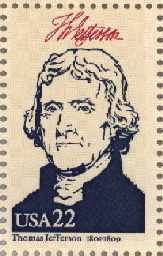
To William Dunbar Washington, Jan. 12, 1801DEAR SIR, -- Your favor of July 14, with the papers accompanying it, came safely to hand about the last of October. That containing remarks on the line of demarcation I perused according to your permission, and with great satisfaction, and then enclosed to a friend in Philadelphia, to be forwarded to it's address. The papers addressed to me, I took the liberty of communicating to the Philosophical society. That on the language by signs is quite new. Soon after receiving your meteorological diary, I received one of Quebec; and was struck with the comparison between - 32 & + 19 3/4 the lowest depression of the thermometer at Quebec & the Natchez. I have often wondered that any human being should live in a cold country who can find room in a warm one. I have no doubt but that cold is the source of more sufferance to all animal nature than hunger, thirst, sickness, & all the other pains of life & of death itself put together. I live in a temperate climate, and under circumstances which do not expose me often to cold. Yet when I recollect on one hand all the sufferings I have had from cold, & on the other all my other pains, the former preponderate greatly. What then must be the sum of that evil if we take in the vast proportion of men who are obliged to be out in all weather, by land & by sea, all the families of beasts, birds, reptiles, & even the vegetable kingdom! for that too has life, and where there is life there may be sensation. I remark a rainbow of a great portion of the circle observed by you when on the line of demarcation. I live in a situation which has given me an opportunity of seeing more than the semicircle often. I am on a hill 500 f. perpendicularly high. On the east side it breaks down abruptly to the base, where a river passes through. A rainbow, therefore, about sunset, plunges one of it's legs down to the river, 500 f. below the level of the eye on the top of the hill. I have twice seen bows formed by the moon. They were of the color of the common circle round the moon, and were very near, being within a few paces of me in both instances. I thank you for the little vocabularies of Bedais, Jankawis and Teghas. I have it much at heart to make as extensive a collection as possible of the Indian tongues. I have at present about 30. tolerably full, among which the number radically different, is truly wonderful. It is curious to consider how such handfuls of men came by different languages, & how they have preserved them so distinct. I at first thought of reducing them all to one orthography, but I soon become sensible that this would occasion two sources of error instead of one. I therefore think it best to keep them in the form of orthography in which they were taken, only noting whether that were English, French, German, or what. I have never been a very punctual correspondent, and it is possible that new duties may make me less so. I hope I shall not on that account lose the benefit of your communications. Philosophical vedette at the distance of one thousand miles, and on the verge of the terra incognita of our continent, is precious to us here. I pray you to accept assurances of my high consideration & esteem, and friendly salutations.
|
